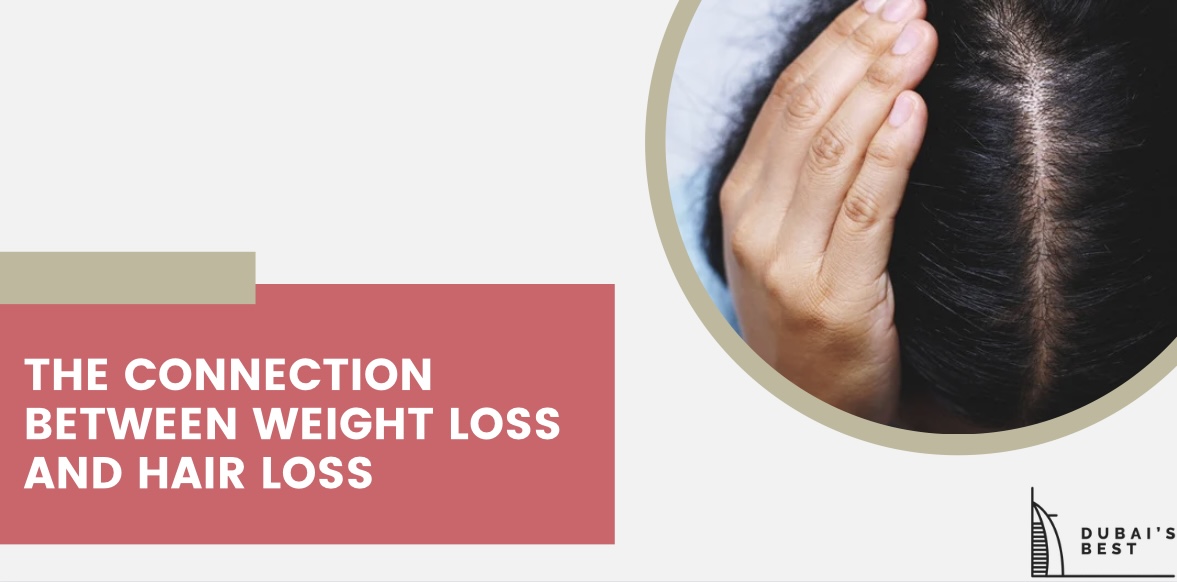The Connection between Weight Loss and Hair Loss
A good diet and regular exercise are the best self-care habits to help the body shed excess weight. However, it is a well-known fact that weight loss can have some negative side effects, including hair loss.
This may not be the first time you’ve heard of the connection between weight loss and hair loss, but what exactly is the link?
About Hair Loss after Weight Loss
Hair loss can be a normal side effect of sudden or extreme weight loss as well as an indication of malnourishment.
Hair is made up of a protein called keratin, which hair follicles use to create new hair cells. An average individual loses approximately 50 to 100 hairs daily.
This is a natural part of the hair growth cycle—but sometimes too much hair can be lost at once, making the issue more noticeable.
Your body needs adequate nutrition in order to grow healthy hair. So if your diet is low in important nutrients like protein, iron, and zinc (all essential components of building proteins like keratin), you may find that you’re losing more hair than usual.
The good news is that most forms of nutrition-related hair loss are temporary. So even if you’re experiencing some extra shed strands right now, it doesn’t mean that your locks won’t return to their former glory in time!
Just make sure you’re getting enough micronutrients to support healthy growth from the inside out.
Why does hair loss occur after weight loss?
There are three main ways in which weight loss can cause hair loss: crash diets, low protein diets, and weight-loss surgeries. Hair loss is often a side effect of rapid changes to your body’s protein levels.
Your hair takes a long time to grow—on average, about six years for the scalp hairs you see growing on your head every day.
As such, the body will look to preserve energy that would otherwise be used to grow hair until it feels like that energy can be spared with minimal risk to the body as a whole.
The failure of a crash diet or cutting out too much protein (which is found in many foods) can prompt this kind of reaction from the body and lead to hair loss.
This kind of hair loss is generally temporary and will stop once you begin eating normally again. Weight-loss surgeries may also result in temporary or permanent hair loss due to rapid weight gain or stress on one’s immune system after surgery.
Is hair loss dangerous?
Hair loss can be a normal part of the aging process, but that doesn’t mean it’s necessarily harmless. It’s true that hair loss doesn’t cause physical injury, and most people who experience hair thinning or balding go on to live very long, healthy lives.
However, hair loss can provoke negative feelings about one’s appearance, which in some cases can escalate into mental health conditions like anxiety and depression.
If you’re concerned about the severity of your thinning or balding, consult with a medical professional so you can develop an appropriate treatment plan to help manage your symptoms.
How do you prevent hair loss when trying to lose weight?
If you are trying to lose weight, the best thing you can do for your hair is to focus on a healthy diet. Eating foods high in lean proteins and whole grains can help prevent hair loss and promote hair growth.
Avoiding crash diets, which severely restrict calories or food groups, is also important since these will likely cause weight loss that is too rapid and therefore more likely to trigger hair loss.
It is also essential to ensure your diet contains healthy sources of vitamins and minerals like zinc, vitamin C, iron, B vitamins, and folic acid.
A lack of these nutrients could lead to telogen effluvium (TE), one of the most common causes of temporary hair loss caused by poor nutrition.
Including a variety of foods rich in these nutrients in your diet—such as seafood, leafy greens, and beans—can help address TE while providing sufficient calories for sustainable weight loss that won’t affect your hair.
While supplements or vitamin injections can be helpful as well, they should not replace a well-balanced diet altogether.
When should you see a doctor?
What constitutes an abnormal amount of hair loss? While most of us experience some hair loss, if you’re noticing a sudden and dramatic change in your scalp or the appearance of bald patches, it’s time to reach out to your doctor.
If someone in your family has experienced alopecia or other forms of rapid hair loss, you should also consider consulting a physician since there could be genetic factors at play.
However, if you have been experiencing excessive shedding (150–200 hairs lost per day), then it is probably time for you to speak with a medical professional.
Additionally, if you’ve been experiencing any signs of fatigue or weight gain that doesn’t seem to improve over the course of several months, you should make an appointment with your doctor just in case there’s a more serious condition behind this symptom.
Thinning hair is a common side effect of weight loss. As body fat is lost, the body produces less estrogen, which is necessary for maintaining healthy hair growth.
However, this doesn’t mean that all thinning hair is due to weight loss, as there are other factors that can cause thinning hair. But if your hair is becoming noticeably thinner and lighter in color, it may be time to see your doctor.

